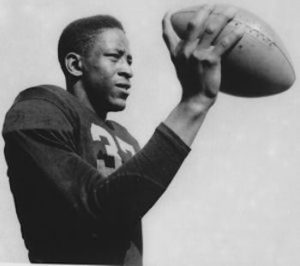
Raymond Kemp
*Ray Kemp was born on this date in 1907. He was a Black football player and coach.
Raymond Howard Kemp was from Cecil, Pa., a region of coal mines and farms where his parents had migrated from Virginia. He played fullback and the baritone saxophone at Cecil Township High School and participated in the oratorical society. ''In that area at that time, it was assumed that Blacks wouldn't go to high school,'' he recalled. ''I had smarter brothers and sisters than I was, but none went to school.''
He graduated from Cecil High School in 1926, and while Kemp never envisioned a pro career, he wanted to play college football. With that in mind, he joined his father in the coalmine after high school. ''I decided that I was going to the coal mines, and I was going to come out to be the baddest football player in the county,'' Kemp said. ''I had my tonsils taken out, my teeth fixed up.'' One afternoon, while Kemp was digging work in the mine, a piece of slate fell and smashed his right foot. The doctor was Kemp's high school coach. ''He said: 'Ray, what are you doing in a coal mine?' '' Kemp said. '' 'You could have a career in college football. I'm afraid if you're not careful, you'll ruin it.'' Kemp left the mine.
He worked in the coalmines around Cecil for one year before enrolling at Duquesne University. Kemp’s arrival at Duquesne coincided with coach Elmer Layden, one of Notre Dame’s legendary four horsemen, who had been hired to resurrect the Iron Dukes’ struggling football program. Looking back at the first day of practice, Kemp recalled seeing only two other Black players. Kemp said, “They were gone after my first year, so I was the only Black on the team. In fact, I can’t remember even playing against another Black player the whole four years I played at Duquesne.”
Kemp, hardened and matured by his year in the mines, became a starter during his sophomore year and received an honorable mention on some All-America lists by the end of his senior season. Layden’s coaching also succeeded beyond expectation. His 1928 team won eight of nine games, and his 1929 team finished the season undefeated. By 1931, Kemp’s senior season, the Dukes had progressed to the point that they played national power Carnegie Tech in a post-season charity game.
Kemp’s entry into the NFL came about because of his success at Duquesne. “Art Rooney came up to me at our athletic banquet following my senior year at Duquesne and told me that he would like me to play for his J.P. Rooney semi-pro team if I was going to stay around Pittsburgh,” Kemp recalled. The following year, Kemp enrolled in graduate school at Duquesne and served as the line coach for Layden. He played for the J.P. Rooneys and the semi-pro Erie Pros as the only Black player in his spare time. Kemp played in the Pirates' first three games against the New York Giants, Chicago Cardinals, and Boston Redskins. After the Redskins game, Kemp was cut by the team.
He appealed the cut to Art Rooney, but Rooney refused to go over the head of the coach, Jap Douds, who, as a player-coach, also played Kemp's position. However, a Pittsburgh Courier story on November 14, 1933, claimed that Kemp was placed on the reserve list and quit, although fans gave him a high rating. Art Rooney stated that he was limited to having only 22 players on the roster and preferred to keep the more experienced players. Kemp returned to his job in the steel mill, and the Pirates went 2-5 over the next seven games.
Walter Francis White of the NAACP suggested he file a discrimination suit. However, Kemp refused, fearing the backlash that would occur to Art Rooney, who had given him a chance at an NFL career. That game against the Giants was the final game of Kemp's career in the NFL. The following season, he was hired as the head football coach at Bluefield State College. With the exits of Kemp and Joe Lillard, the NFL would not have any Black players until 1946.
Kemp led the Blues to an 8-0-1 record in his first season at Bluefield State. That year was the first of a thirty-nine-year career as a successful coach and athletic director at Bluefield, Lincoln (MO) University, and Tennessee A&I College. Ray Kemp died on March 26, 2002. He is buried in Greenlawn Memory Gardens Cemetary, North Kingsville, Ohio.
Bob Barnett,
Special to the Pro Football Hall of Fame
2121 George Halas Dr. NW
Canton, Ohio 44708